We offer a wide range of services to help care for your pets. Our clinic is equipped to handle everything from regular health checkups to emergency services, including surgery. We use all state of the art equipment and adopt the newest technological advances to ensure a clean, safe, and welcoming environment.
Services We Offer
Preventative Care
Ongoing preventative care is essential to maintaining your pet’s health. Dogs and cats should be seen at least yearly in order to ensure any emerging health issues are dealt with quickly or prevented.
As stated by the American Veterinary Medical Association,
“The old adage, ‘an ounce of prevention is worth a pound of cure’ certainly holds true when it comes to pet health. The cost of prevention is often a fraction of the cost of treating a disease or problem once it has become more advanced, and early diagnosis and treatment of developing problems or diseases can increase the likelihood of successful outcomes.”
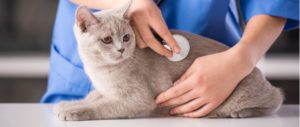 ___________________________________________________________________
___________________________________________________________________
Examinations
These generally consist of the Doctor analyzing the conditions of the following:
- Ears and Eyes
- Musculoskeletal condition
- Heart and Lungs
- Teeth and Mouth
- Skin
- General body condition
- Stool, urine, ear, blood, etc. samples
Vaccinations & Preventative Medicine
In order to prevent deadly diseases, both dogs and cats have a series of core vaccines
Dogs:
- Canine Parvovirus, Distemper, Adenovirus, Parainfluenza Rabies
- Lyme, Leptospirosis, Bordetella
Cats:
- Feline Distemper (panleukopenia), Calcivirus, Herpesvirus, Rabies
- Feline leukemia virus, Feline immunodeficiency virus
Additionally, preventative medicines are available for fleas, ticks, and heartworms.
Dental Care
As pets age, teeth begin to build up periodontal disease- causing plaque or pets may have damaged teeth. Routine dental cleanings may be recommended based on the pet’s condition.
Parasite Screening
Both dogs and cats are susceptible to parasites from other animals or the environment. Stool samples are generally screened for common parasites such as roundworms, hookworms, tapeworms, and whipworms.
Blood tests
Blood tests can tell the Doctor how the pet is doing internally. Various tests such as blood cell counts, chemistry, glucose, electrolytes, and much more can be done. Routinely checking these levels will allow changes caused from illness to be caught early.
Other blood tests, that detect antigens or antibodies, can determine whether a pet has a viral or bacterial infection.
Weight Management
Maintaining a healthy weight in both dogs and cats is important for long term health. Obesity can increase the risk of disease and injury, while anorexia can be a sign of severe illness.
Surgeries
The main preventative surgeries are spays and neuters. These surgeries can prevent reproductive cancers, infections, and behavioral issues.
Puppies and Kittens
Very young animals are highly susceptible to infectious disease because their immune system is not yet fully mature. They receive protection through antibodies in their mother’s milk, but the protection is not long-lasting and there may be gaps in protection as the milk antibodies decrease and their immune system is still maturing. Maternal antibodies can also interfere with a puppy’s or kitten’s vaccine response, so a series of vaccines is typically recommended to ensure that the puppy or kitten receives a vaccine as early as possible after maternal antibodies subside.
In many instances, the first dose of a vaccine serves to prime the animal’s immune system against the virus or bacteria while subsequent doses help further stimulate the immune system to produce the important antibodies needed for long-term protection. [AVMA, Vaccinations]
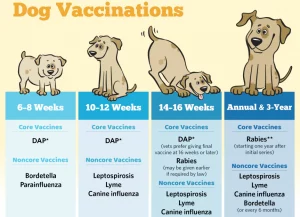
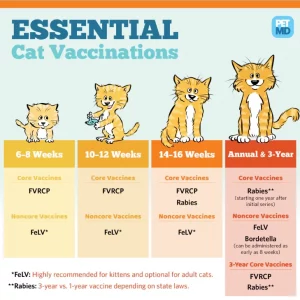
Click Here for More Information on Vaccines
Dentistry
Just like humans, dental hygiene is an important part to keeping our pets healthy. The Veterinarian will check the condition of your pets teeth at their yearly wellness and determine whether they need a dental procedure. If your pet has any signs of dental issues such as excessive drooling, bad breath, inflammation of the gums, pain, bleeding, or inability to eat, the doctor should see your pet sooner.
Some of the dental procedures we offer include:
- Cleaning and polishing
- Extraction of unhealthy teeth
- Dental x-rays
- Removal of unshed baby teeth
- Abscess and tumor treatment
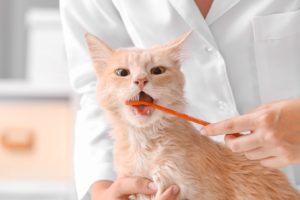
Anesthetic Use for Dental Treatments
Unlike humans, dogs and cats do not understand that dental treatments are meant to help. Anesthesia is used for all patients undergoing dental procedures in order to limit risk to both your pet and our veterinary staff.
AKC Reunite Microchips
A microchip offers a permanent identifier for your pet that lies below their skin. If they get lost, the microchip is scanned and you will be able to be reunited.
Laboratory Diagnostics
Bloodwork
In house analyzers are able to test blood parameters of the following:
- Chemistry (electrolytes, proteins, fats, glucose, and more)
- Hematology (blood cell counts, hemoglobin, blood cell indices)
- Bacterial and Viral Infection (lyme/lepto disease, heartworm, parvo, and more)
- Pre-Anesthetic Bloodwork: this uses a combination of the tests above to determine whether your pet is healthy enough to be put under anesthesia
Urinalysis
We test urine for the presence of things that may indicate disease or infection
- Crystals, proteins, blood, pH, glucose, bacteria, cells
Parasite screening
Stool samples are generally taken to test for parasites, such as:
- Roundworms, whipworms, hookworms, tapeworms, giardia, and coccidia
Microbiology/Cytology
The veterinarian may take a swab or aspirate of the ears, lumps, skin, or body fluids to examine the cells present
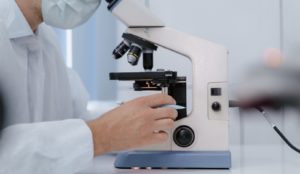
Emergency and Urgent Care
We never expect an emergency to happen to our animals, but when one does, you can rest assured that our team can help. Copper Country Vet is available for emergencies during and after business hours. Weekends are rotated between our clinic and Northland Veterinary Clinic.
*Maintaining a veterinary-client-patient relationship (at least yearly wellness exams for dogs and cats) will ensure that we are able to see your pet for emergency services in a timely fashion. Non-clients may be referred to another clinic if we are unable to see them.
Signs your pet is having an emergency:
- Severe bleeding
- Choking, difficulty breathing, nonstop gagging or coughing
- Bleeding from nose, mouth, rectum, coughing up blood, blood in urine
- Inability or pain when passing stool or urine
- Pet has eaten something poisonous – antifreeze, xylitol, chocolate, rodent poison
- Seizures, staggering
- Broken bones, inability to move limbs
- Signs of pain
- Heat stress or heat stroke
- Severe vomiting, diarrhea
- Refusal to drink for more than 24 hours
- Unconsciousness
For after-hours emergency care, call 906-482-1771 and follow the voicemail instructions. If the doctor does not answer immediately, please leave a message with your name, phone number and nature of emergency. The doctor will return your call as soon as possible.
Click Here for Information on How to Know When Its a Cat Emergency
Click Here for Information on How to Know When Its a Dog Emergency
Surgery and Anesthesia
Spaying and Neutering
Both cats and dogs are recommended to get spayed or neutered. These procedures are important for reducing the risk of sex related diseases and cancers, reducing behavioral issues, preventing unwanted litters, and keeping shelter populations lower.
Timing of a spay or neuter will depend on your animal’s situation and the doctor will talk about it at your exam.
Click Here for More Information on Spaying and Neutering
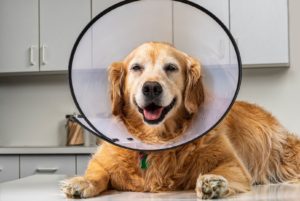
Gastropexy
A gastropexy is a procedure in which the side of the stomach is attached to the internal body wall. This prevents deadly GDV (gastric dilation and volvulus), which is especially prevalent in breeds such as Great Danes, German Shepherds, Standard Poodles, Basset Hounds, Weimaraners, and Irish Setters. This procedure is recommended at the time of spaying or neutering.
Click Here for More Information on Gastropexies
Orthopedics
Canines and felines are both prone to having orthopedic injury within their lifetime. We offer various orthopedic procedures depending on your pet’s condition. This includes cruciate ligament rupture repair via a procedure called a TPLO (tibial plateau levelling osteotomy), and fracture repairs.
Click Here for More Information on Orthopedic Surgeries
Emergencies
In the unfortunate event that your pet needs emergency surgery, we are able to provide many of the necessary procedures. However, in the case that our clinic is not equipped to perform a procedure, we may recommend you to a more specialized clinic or ER.
A few of the procedures we perform include foreign body removal, C-sections, pyometra removal, fracture repairs, laceration repair, urinary blockage removal (perineal urethrostomy), bloat, and more.
See our emergency page for more information on what to do in an emergency.
Mass Removals
Removal of masses may be a necessary procedure to check for cancer or remove a diseased organ. Generally, the mass will be removed and sent off for a biopsy so that we can find out whether it may be malignant.
Anesthetic Use
Anesthesia is a necessary part of all surgeries on animals. Unfortunately our pets do not understand that procedures are meant to help them, so using anesthesia reduces both the risk for the veterinary team and the stress of your pet.
There are risks with any surgical procedure that involves anesthesia and this is something that the veterinarian will consider with you before any surgery. Pre-anesthetic bloodwork is highly recommended to determine whether your pet is fit to undergo anesthesia.
Fluid Therapy
Staying hydrated is an essential part for all animals health. Fluid therapy is a beneficial way to ensure a patient stays hydrated. In addition to this, it can replenish certain electrolytes, offer a route of administration for IV drugs, take a patient out of shock, and maintain stability during and after surgery.
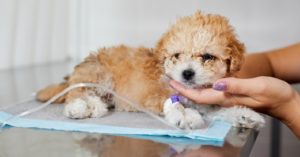
End-of-Life Care
Euthanasia Consult
Making the decision to put your pet to sleep is never an easy one, but it is sometimes what is best for our pets. Our veterinarians will help you to determine whether euthanasia is the right option.
Cremation Services
Our clinic works with Copper Country Crematory to ensure your pets remains are well cared for.
Diagnostic Imaging and EKG
Nutritional Management
Prescription Diets
Pharmacy
Prescription Diets
